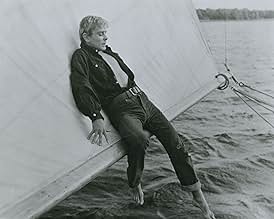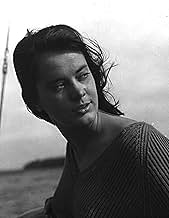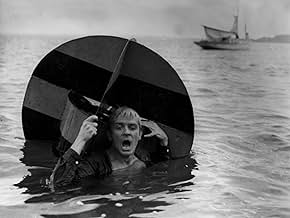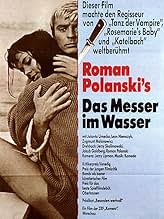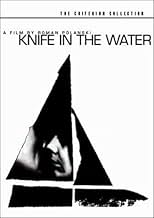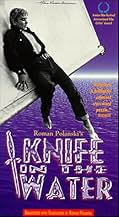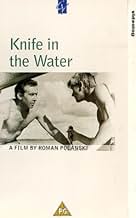VALUTAZIONE IMDb
7,4/10
24.469
LA TUA VALUTAZIONE
Sulla strada per una gita in barca, un marito e sua moglie invitano lungo un giovane autostoppista.Sulla strada per una gita in barca, un marito e sua moglie invitano lungo un giovane autostoppista.Sulla strada per una gita in barca, un marito e sua moglie invitano lungo un giovane autostoppista.
- Regia
- Sceneggiatura
- Star
- Candidato a 1 Oscar
- 1 vittoria e 2 candidature totali
Anna Ciepielewska
- Krystyna
- (voce)
- (non citato nei titoli originali)
Roman Polanski
- Young Man
- (voce)
- (non citato nei titoli originali)
Recensioni in evidenza
While driving to sail with his wife Krystyna (Jolanta Umecka) in his yacht, the arrogant and wealthy Andrzej (Leon Niemczyk) "stumbles" with a drifter (Zygmunt Malanowicz) in front of his car hitchhiking on the lonely road. Andrzej gives a ride to the young man with despisal. When they reach the marina, Andrzej unexpectedly and without any reason invites the young man to sail with them, initiating a tense dispute of power with the youth, in a claustrophobic and erotic environment.
"Nóz w Wodzie" is a claustrophobic, tense and erotic little movie of the earlier career of Polanski. The simple story is supported by a magnificent cinematography and camera work with unusual angles, and great performances of the lead cast. The Brazilian DVD shamefully misses many subtitles, leaving without translation many sentences in the dialogs. I immediately recall at least two movies that used concepts of this screenplay: "Dead Calm" and the open end of Adrian Lyne"s "Unfaithful". My vote is seven.
Title (Brazil): "Faca na Água" ("Knife in the Water")
"Nóz w Wodzie" is a claustrophobic, tense and erotic little movie of the earlier career of Polanski. The simple story is supported by a magnificent cinematography and camera work with unusual angles, and great performances of the lead cast. The Brazilian DVD shamefully misses many subtitles, leaving without translation many sentences in the dialogs. I immediately recall at least two movies that used concepts of this screenplay: "Dead Calm" and the open end of Adrian Lyne"s "Unfaithful". My vote is seven.
Title (Brazil): "Faca na Água" ("Knife in the Water")
Knife in the Water is the debut feature film from Polish director Roman Polanski. It is a very minimalist film, shot in black and white, and spoken in Polish. It isn't much by you have to start somewhere. The film is about a rich writer and his young wife. They are going sailing for the day, but on the way to the docks they pick up a hitchhiking student whom we never learn the name of. They allow the student to accompany them on their day tour of the lake, a decision they will forever regret. Tensions start to slowly boil on the boat as relationships grow more and more heated. Almost the entire film takes place on the boat and these three are the only people in the whole movie. It is the definition of minimalist filmmaking in looks, as well as content.
Knife in the Water is, for lack of a better word, dull. Not much happens and I never feel like this film is going anywhere. It is a mere 94 minutes, but the first 70 of those minutes seem to be useless and mundane. There are moments when you think it is going to pick up, but it never really does. It is a slow film that chronicles every little moment of this trip to sea and it eventually grows tiresome to just watch these characters rig up ropes, steer the boat, cook food, eat food, play games, etc. The film does start to pick up in about the last twenty minutes as events start shaking up the story so that it can come to a vague resolution. And yet the film still lacks any kind of "aha!" moment and is devoid of any real wow! factor.
The film's central focus is on the relationship between the three characters on the book so most of the action is meant to develop the characters. The development is just as slow as everything else, however. We get to know these characters very well, but in the end we sort of regret it. There isn't much to know about these people and their stories lack any sort of intrigue. When I finally started to figure out these people I was hit with a faint breeze of anticlimactic. Then things begin to pick up, slow down again, become mildly interesting, then the film ends. And then as the screen fades to black I sort of just shrugged my shoulders and walked away.
You could argue that there is a lot of subtext here with lots of things open to interpretation. The film is vague in location, time, and character background, so there is a certain amount of this film that you could interpret in all sorts of bizarre and far fetched ways. Personally, I don't see it. I realize where a lot of the deeper prying into the film comes from. People want to see a lot more in this film than what I believe is actually there. What I did feel was a certain amount of tension that was underlying the entire film in a very discreet and possibly non existent way. Again, I feel like I was expecting something more to this film than what was actually there, thus the tension and uneasiness was all fabricated in my mind. This is just a weird movie to wrap your head around, and it doesn't seem to amount to much in the end.
Knife in the Water left me expecting a lot more. It just isn't an incredibly fascinating film. It isn't a bad film, but it isn't that great and I definitely wouldn't watch it again. I like Roman Polanski a lot and so I was really interested to see his very first feature film so it was pretty disappointing to see what little his first feature amounted to. If I had seen this in 1962 I probably wouldn't have thought much of Polanski, but of course I know how renowned he is in 2011, so Knife in the Water in no way hurts my opinion of the man's work.
Knife in the Water is, for lack of a better word, dull. Not much happens and I never feel like this film is going anywhere. It is a mere 94 minutes, but the first 70 of those minutes seem to be useless and mundane. There are moments when you think it is going to pick up, but it never really does. It is a slow film that chronicles every little moment of this trip to sea and it eventually grows tiresome to just watch these characters rig up ropes, steer the boat, cook food, eat food, play games, etc. The film does start to pick up in about the last twenty minutes as events start shaking up the story so that it can come to a vague resolution. And yet the film still lacks any kind of "aha!" moment and is devoid of any real wow! factor.
The film's central focus is on the relationship between the three characters on the book so most of the action is meant to develop the characters. The development is just as slow as everything else, however. We get to know these characters very well, but in the end we sort of regret it. There isn't much to know about these people and their stories lack any sort of intrigue. When I finally started to figure out these people I was hit with a faint breeze of anticlimactic. Then things begin to pick up, slow down again, become mildly interesting, then the film ends. And then as the screen fades to black I sort of just shrugged my shoulders and walked away.
You could argue that there is a lot of subtext here with lots of things open to interpretation. The film is vague in location, time, and character background, so there is a certain amount of this film that you could interpret in all sorts of bizarre and far fetched ways. Personally, I don't see it. I realize where a lot of the deeper prying into the film comes from. People want to see a lot more in this film than what I believe is actually there. What I did feel was a certain amount of tension that was underlying the entire film in a very discreet and possibly non existent way. Again, I feel like I was expecting something more to this film than what was actually there, thus the tension and uneasiness was all fabricated in my mind. This is just a weird movie to wrap your head around, and it doesn't seem to amount to much in the end.
Knife in the Water left me expecting a lot more. It just isn't an incredibly fascinating film. It isn't a bad film, but it isn't that great and I definitely wouldn't watch it again. I like Roman Polanski a lot and so I was really interested to see his very first feature film so it was pretty disappointing to see what little his first feature amounted to. If I had seen this in 1962 I probably wouldn't have thought much of Polanski, but of course I know how renowned he is in 2011, so Knife in the Water in no way hurts my opinion of the man's work.
Roman Polanski's first full length feature is a simple, minimalist piece filled with male posturing, dead end situations, claustrophobic environments and eerie calm. This is part of Polanski's art house beginnings, but many of its themes and much of its style would be carried through to his later, more accessible work.
Like many a Polanski picture, Knife in the Water shows us men competing over a woman. Typically however this is to the end of making the men look ridiculous rather than objectifying the woman. Here the competition is the central theme, and the bulk of the film is basically a series of set pieces in which the middle-aged husband and the young hitchhiker attempt to outdo each other or show the other up. This drama is concentrated and focused by having only the three characters, and confining the action almost entirely to one location. This kind of minimalism is a safe, simple way to make a straightforward, uncluttered story a good strategy for an up and coming director but it's a lot harder to make a really great picture out of such simple elements, and the young Polanski does fall somewhat short here.
What Polanski does have is his natural talent and feel for cinematic form. His sense of rhythm was evident from his earliest shorts, and by this point he had clearly settled upon a style of slow, even paces, letting scenes take as much time as they needed and never being afraid to hold a shot into so-called "dead time" if he felt it was necessary. Often, the stillness of Polanski's pictures could build up a greater feeling of dread or tension than speed and shocks. Here, the pace is leisurely, in tune with Komeda's breezy jazz score, a sound synonymous with early Polanski. It may be slow but Knife in the Water has great atmosphere.
Another of Polanski's strengths was in his feel for space, particularly confined space. In Knife in the Water we have a kind of contradiction on this level, because a small boat in the middle of a lake is both a very wide open space and a small confined one. You kind of get half the effect of a later Polanski picture such as The Tenant you do get the sense that the characters and the camera itself are incredibly restricted in their environment, but of course you don't get that feeling of all the walls pressing in on you. Nevertheless, Polanski was a master at creating this sense, and he does tend to surround the camera with bits of boat or actor. There are numerous close-ups typical of the early Polanski although it's something he would drop later in his career which give a slightly surreal look to some of the shots. A particularly effective moment is the first shot of the boat drifting out across the lake with trees dotted in the background, which then cuts to a close-up of Krystyna, the wife, lying on her back filling the lower half of the frame, with the exact same background as the previous shot.
Knife in the Water is a fairly good film with some good ideas. It suffers a bit from style over substance but is well acted and well directed and is not long enough to get overly tedious. Better things were to come from Polanski once he moved out of Poland and began his English-language film career.
Like many a Polanski picture, Knife in the Water shows us men competing over a woman. Typically however this is to the end of making the men look ridiculous rather than objectifying the woman. Here the competition is the central theme, and the bulk of the film is basically a series of set pieces in which the middle-aged husband and the young hitchhiker attempt to outdo each other or show the other up. This drama is concentrated and focused by having only the three characters, and confining the action almost entirely to one location. This kind of minimalism is a safe, simple way to make a straightforward, uncluttered story a good strategy for an up and coming director but it's a lot harder to make a really great picture out of such simple elements, and the young Polanski does fall somewhat short here.
What Polanski does have is his natural talent and feel for cinematic form. His sense of rhythm was evident from his earliest shorts, and by this point he had clearly settled upon a style of slow, even paces, letting scenes take as much time as they needed and never being afraid to hold a shot into so-called "dead time" if he felt it was necessary. Often, the stillness of Polanski's pictures could build up a greater feeling of dread or tension than speed and shocks. Here, the pace is leisurely, in tune with Komeda's breezy jazz score, a sound synonymous with early Polanski. It may be slow but Knife in the Water has great atmosphere.
Another of Polanski's strengths was in his feel for space, particularly confined space. In Knife in the Water we have a kind of contradiction on this level, because a small boat in the middle of a lake is both a very wide open space and a small confined one. You kind of get half the effect of a later Polanski picture such as The Tenant you do get the sense that the characters and the camera itself are incredibly restricted in their environment, but of course you don't get that feeling of all the walls pressing in on you. Nevertheless, Polanski was a master at creating this sense, and he does tend to surround the camera with bits of boat or actor. There are numerous close-ups typical of the early Polanski although it's something he would drop later in his career which give a slightly surreal look to some of the shots. A particularly effective moment is the first shot of the boat drifting out across the lake with trees dotted in the background, which then cuts to a close-up of Krystyna, the wife, lying on her back filling the lower half of the frame, with the exact same background as the previous shot.
Knife in the Water is a fairly good film with some good ideas. It suffers a bit from style over substance but is well acted and well directed and is not long enough to get overly tedious. Better things were to come from Polanski once he moved out of Poland and began his English-language film career.
Devastating and beautiful early film from talented director Roman Polanski...but 'beautiful' in a sad, melancholy sense. Rarely have I seen a picture which so vividly captures the wonder of weather (gray and drizzly skies and choppy sea water, illuminated suddenly by a burst of sun rays). Sure, the film is in black-and-white, however that foreboding sky actually becomes a character in the plot involving a couple out for a boating weekend who pick up a hitchhiker and invite him along on their trip. Not a whole lot of story (in the conventional sense), though both Jerzy Lipman's amazing cinematography and Krzysztof Komeda's jazzy score make the journey a worthy ride which builds in suspense and a creepy, muted kind of ambiance. Polanski's eye is unerring, but don't expect him to give into a big pay-off. The narrative is pretty much based in reality--it's grounded--and is without major outbursts, violence or melodrama. *** from ****
Polanski's first feature, on paper, sounds like nothing more than a run-of-the-mill claustrophobic thriller set on a boat - a couple takes a loner on board, you figure out the rest. 'Dead Calm', 'The Deep', etc etc etc.
Instead, 'Knife In The Water' is an agonisingly tense look at male posturing & ego, the husband & hitch-hiker constantly challenging each other in every possible way - sailing prowess, games of fiddlesticks, knife throwing & just generally strutting about. There's almost never a single moment where the two aren't trying to trump each other, & one gets the impression that it's not even to impress the girl, so much as themselves. As the film progresses, the tension mounts & tempers fray.
In a Hollywood film, this would build up to a dramatic climax of violence & catharsis, accompanied with thunder & lightning. Polanski doesn't let us off the hook that easily - things get rough, but the games continue, right until the very end of the film.
Shot in black & white, with a cast of three, & virtually one small location, 'Knife In The Water' puts bigger films to shame. No stars, no pyrotechnics, no special effects, probably very little budget, & it's completely riveting from start to finish.
It was nominated for the Best Foreign Film at the Oscars - the first feature of a young Polish film student - & rightly so.
A brilliant start to a brilliant career.
Instead, 'Knife In The Water' is an agonisingly tense look at male posturing & ego, the husband & hitch-hiker constantly challenging each other in every possible way - sailing prowess, games of fiddlesticks, knife throwing & just generally strutting about. There's almost never a single moment where the two aren't trying to trump each other, & one gets the impression that it's not even to impress the girl, so much as themselves. As the film progresses, the tension mounts & tempers fray.
In a Hollywood film, this would build up to a dramatic climax of violence & catharsis, accompanied with thunder & lightning. Polanski doesn't let us off the hook that easily - things get rough, but the games continue, right until the very end of the film.
Shot in black & white, with a cast of three, & virtually one small location, 'Knife In The Water' puts bigger films to shame. No stars, no pyrotechnics, no special effects, probably very little budget, & it's completely riveting from start to finish.
It was nominated for the Best Foreign Film at the Oscars - the first feature of a young Polish film student - & rightly so.
A brilliant start to a brilliant career.
Lo sapevi?
- QuizThe first scene in the film shows Andrzej and Krystyna driving a car. As shooting from the platform in front of the car was not yet available, the crew was tied to the car, standing on its mask. To get the proper light effects, they held a blanket with a small hole for the camera. Leon Niemczyk (Andrzej) was really driving this car quite fast (this was crucial to this scene), but he couldn't see anything. He drove the car using the tops of the trees to imagine where the road is.
- BlooperWhen the young boy is trying to stabilize the Christine by hanging off its side, the railing of the camera boat can be seen in the lower left-hand corner of the screen.
- ConnessioniEdited into Spisok korabley (2008)
I più visti
Accedi per valutare e creare un elenco di titoli salvati per ottenere consigli personalizzati
- How long is Knife in the Water?Powered by Alexa
Dettagli
- Tempo di esecuzione1 ora 34 minuti
- Colore
- Mix di suoni
- Proporzioni
- 1.37 : 1
Contribuisci a questa pagina
Suggerisci una modifica o aggiungi i contenuti mancanti

Divario superiore
By what name was Il coltello nell'acqua (1962) officially released in India in English?
Rispondi
